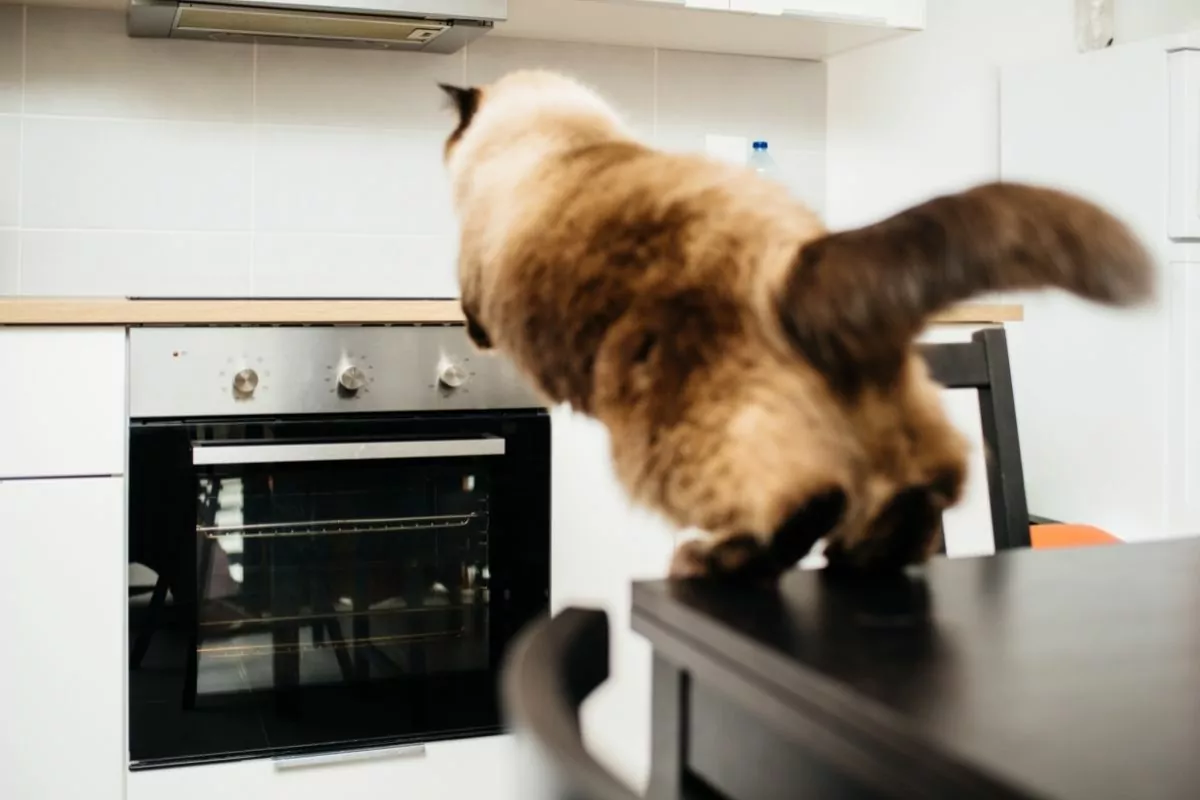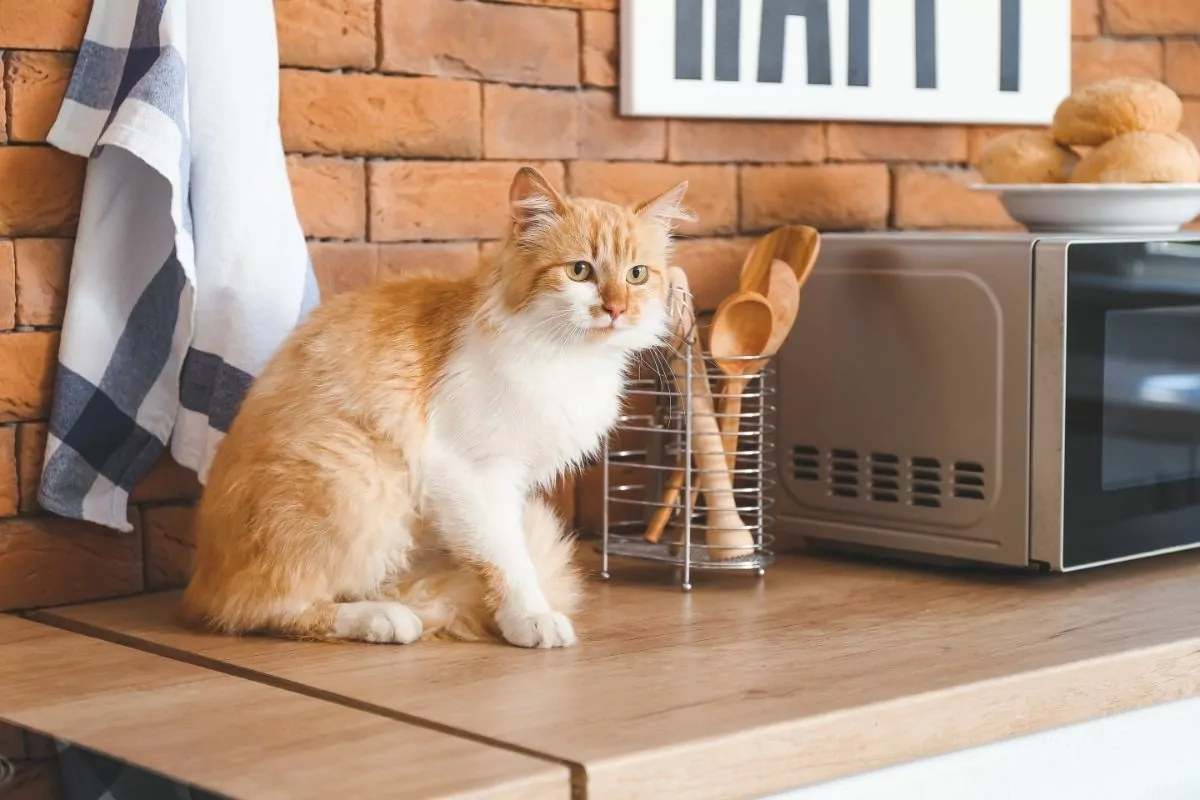Does your cat like to jump onto the kitchen counter and leave you with a mess?
One of the most common problems cat owners face is how to keep a cat off the counter or other high surfaces where it could get hurt. You love your cat, but it’s driving you crazy.
It seems like every time you turn around, there is another dirty paw print on the counter, or worse, something has been knocked off and broken! This can be frustrating for both of you. We have some tips that will help keep your kitty from jumping up on counters so much.
Read on to learn more about keeping stubborn cats off the counter.

Why Do Cats Jump on Counters?
There are a few reasons why cats like to jump up on counters. One is that they can see something’s going on in the kitchen, and they want to be able to watch what’s happening. They may also see the counter as a place where they can better view their surroundings.
Another reason cats like to jump up onto high surfaces is that it just feels good to them. It feels good on their feet, and they also desire height because it makes them feel safe.
How to Keep Cat Off Counter- Strategies That Work
You can do a few different things to keep your cat off the counter:
- Apply sticky tape to the edge of the counter: Cats don’t like sticky tape on their paws, and they will usually avoid it.
- Hang a vinyl carpet runner with the nubby side up along the edge of the counter: Cats don’t like to jump onto this kind of surface because it feels funny under their paws.
- Spray your cat with water when it jumps up on the counter: This may sound mean, but it’s very effective. Cats don’t like getting wet, and they will often avoid areas where they have been sprayed in the past.
- Put a lid on your garbage can: Garbage cans are a big attraction for cats because of the smell. If you put a lid on the can, your cat will be less likely to jump up on the counter.
- Hang a citrus-scented air freshener near the kitchen counters: Cats don’t like the smell of citrus, and they will typically stay away from areas where it is prominent.
- Install a ceiling fan in the kitchen: Cats are afraid of ceiling fans because they could get hurt if they fall off one. So, if you have a ceiling fan in your kitchen, turn it on regularly so that your cats stay away from that area.
- Keep your countertop clean: This is probably the most important thing you can do. A clean counter will not tempt your cat as much. Make sure to sweep and mop regularly and wipe down any spills or messes as soon as they happen.
- Provide legal jumping targets: If you can’t keep your cat off the counter, provide a safe place for it to jump up on instead. For example, you can buy or make a tall scratching post for your cat to use as a jumping target.
- Remove Food: If you have a cat that jumps up on the counter to eat, remove all food from the counters as soon as everyone is done eating. This will make it much less appealing to your cat and a lot easier to clean.
- Install a scratching post: Consider installing a scratching post in the kitchen if your cat likes to scratch. This will give your cat a place to scratch away from the counter.
- Put a gate up: If you don’t want your cat to be able to get up on the counter, consider putting up a gate. This will keep your cat from being able to jump up there.
- Train your cat with positive reinforcement: If you catch your cat jumping on the counter, say “no” in a firm voice and then immediately give them a treat. This will help train your cat that jumping on the counter is not allowed.
Putting these tips into practice should help keep your cat off the counter and out of mischief.

Cat and Tinfoil- Do They Mix?
Cats are often attracted to shiny objects, which can sometimes include aluminum foil. Some people believe that if you wrap aluminum foil around your countertops, it will keep cats away. However, there is no scientific evidence to back up this claim.
If you’re having trouble keeping your cat off the counter, place a piece of tinfoil over the counter. Cats don’t like the way it feels on their paws, so they’ll usually avoid stepping on it.
Scent Deterrents That Will Keep Cats Off Counters
If you’re looking for a more permanent solution to keeping your cat off the counter, there are a few different cat counter deterrents that can be effective.
One popular option is citrus. Unfortunately, cats don’t like the smell of citrus, so you can try spraying some orange or lemon peels on the countertop. You can also buy commercial products like “No-Cat!”
There are also some scents that cats will avoid, like lavender oil. You can try spraying your counter with it or just putting some fresh lavender near the edge of the counter. Other scents that cats don’t like include eucalyptus and cedarwood.
You can try repurposing various household products like hairspray or vinegar, as far as sprays go. However, ensure the repellent is safe to spray around your cat- otherwise, you could end up making things worse rather than better.
Training Your Cat Not to Use the Counter Tops
If you’ve tried all of the above and your cat is still jumping up on the counter, it’s time to try some behavioral training. There are classes available that can help teach your cat not to jump up on counters, but they can be expensive and may not be available in your area.
Another option is to consult with a veterinarian or animal behaviorist. They may be able to help you figure out what’s causing your cat to engage in this undesired behavior and provide a solution.
It’s essential to keep in mind that behavioral training may take time and patience, but it can be successful in the end.
What NOT to Do
It’s important to remember that not every solution will work for every cat- you may have to try a few different things before finding something that works. And, as always, be sure to consult with your veterinarian if you’re having any problems with your cat.
There are a few things you should never do if your cat is jumping on the counters:
- Don’t punish your cat: This will only make it fearful of you and may cause it to become aggressive.
- Don’t try to scare your cat with loud noises or threats: It won’t understand what you’re saying and will just become more anxious.
- Don’t use anything that could be harmful to your cat: If you’re using a spray repellent, make sure it’s safe to spray around it.
- Don’t punish your cat: This will only make it afraid of you and may not help to solve the problem.
- Don’t give up: With patience and persistence, you can get your cat to stop using the countertops as a scratching post.
- Finally, never try to force your cat down: If it’s trying to jump up on the counter, it has a reason for doing it. You’ll just end up scaring it if you grab it or try pulling it off the edge of the counter.

Summary
There are a few different ways to keep your cat off the countertops, including using citrus smells, scents that cats don’t like, and behavioral training. However, it’s important to remember that not every solution will work for every cat, so you may have to try a few different things before finding something that works.
You should never use anything that could be harmful to your cat if it’s jumping on the counters. And, finally, don’t give up! With patience and persistence, you can get your cat to stop using your countertops as a scratching post.
You may also want to visit a pet supply store and get some Feliway spray or a diffuser for your home. This will help keep your cat calm and happy, so it doesn’t feel the need to jump up on counters.
So, there you have it: a few different ways to keep your cat off the countertops. But, with a little effort, you can create a safe and cat-free zone in your kitchen.
